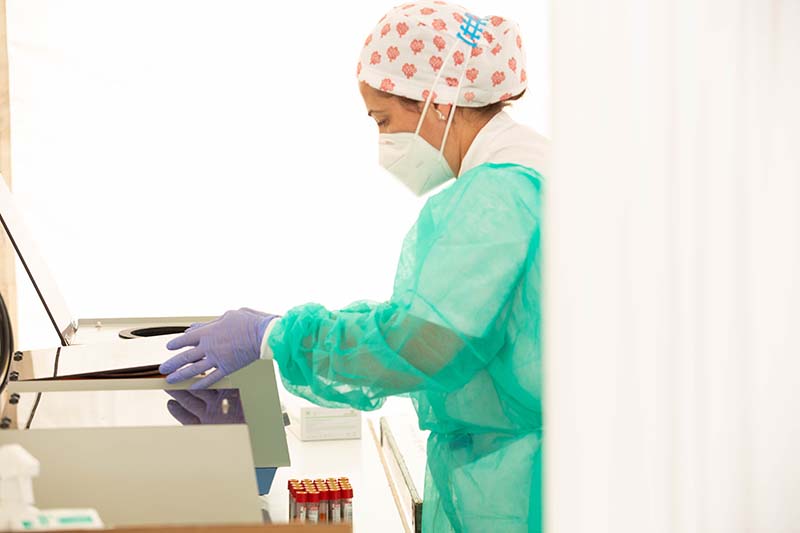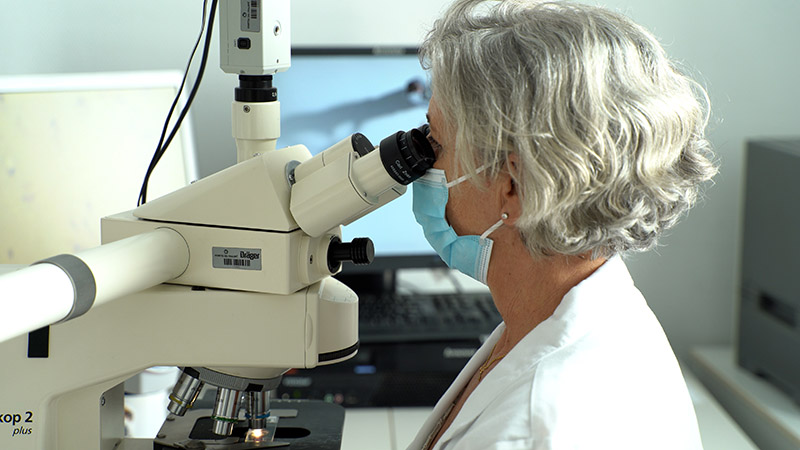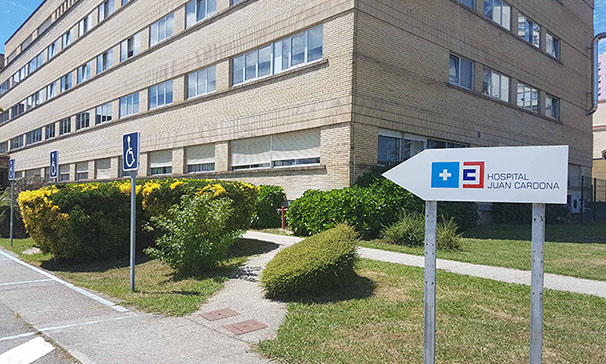
by S0p0rt3 | Sep 24, 2021 | Ribera |
- The Ribera healthcare group’s laboratory division has increased the number of tests carried out in order to help ensure safety during the de-escalation and avoid a fourth wave.
- The testing and analysis center of reference in Alicante, Cialab, owned by the group, is specialized in the organization and logistics of Covid tests for groups and communities, and they travel to companies, professional bodies and events in order to control the spread.
Valencia, 1st, March, 2021 – Riberalab, the Ribera healthcare group’s laboratory division, is strengthening the Covid testing service in its center in San Juan, Alicante, in order to help ensure safety during the de-escalation which begins today in the Valencian Community, with the re-opening of terraces in hospitality, an end to the weekend perimeter closure of big cities and with up to four people now, who aren’t living together, being able to meet in public spaces.
The testing and analysis center of reference in Alicante, Cialab, now owned by the Ribera group and managed by Riberalab, is strategically placed, at San Juan beach (Alicante). It is specialized in the organization and logistics of Covid tests for individuals at the center, as well as groups and communities, for whom they carry out the test on site, at the company branch, professional body or entity concerned, with the aim of avoiding the movement of their workers, speeding up the process and reducing the waiting time for results. Cialab is also a benchmark in the carrying out of genetic and molecular analysis, which includes prenatal and oncohematological cytogenetics as well as the detection of hereditary diseases.
With all eyes on the San José long weekend and the imminent arrival of Holy week and Easter, Riberalab are carrying out Covid tests for those with an appointment, with total safety, either in their center in San Juan or by arranging for their professionals to travel to workplaces or community areas. The aim is to carry out the greatest number of tests possible, adapting to the demand, in order to help the de-escalation and avoid a fourth wave and an increase in coronavirus cases.

by S0p0rt3 | Sep 24, 2021 | Uncategorized |
- Human health, animal health and the health of ecosystems are the main areas that are considered to have a decisive impact on Public Health.
- The objective is to increase communication and interdisciplinary collaboration to approach health from an integrated point of view, including health, economic, social and cultural factors.
Valencia, 2nd, September, 2021 – The Ribera healthcare group has joined the “One Health” strategy to promote “a global vision of health all over the world” according to the healthcare director, Doctor Carlos Catalán. With ten hospitals and 62 Primary Care centers in Spain, more than 7,000 professionals, a million patients annually, 46 quality accreditations and 175 national and international awards, the Ribera group frames this within their responsible health model which bases its strategy on improving the health and well-being of citizens.
“One Health” is a global initiative that aims to improve communication and interdisciplinary collaboration in taking care of the health of people, animals and the environment, with it being understood that there are many factors that influence care in Public Health and the well-being of the global population. “We are experiencing a historical moment, with a global pandemic as a consequence of Covid, which should make us reconsider the importance of approaching the health of the population from a holistic perspective”, Doctor Catalán explains.
In fact, this initiative, promoted by the Food and Agriculture Organization of the United Nations (FAO), the World Health Organization (WHO) and the World Organization for Animal Health (OIE), promotes collaboration between institutions, health organizations, professional bodies and universities. Its aim is to approach the health challenges of the population from an integrated point of view, considering not only the interrelation between the health of the population and that of animals, a key aspect after the appearance of viruses that have led to epidemics and to this pandemic, but all factors that have an influence.
“Health, economic, social and cultural factors greatly influence resource organization and planning, as well as preventative measures and the healthcare of the population”, explains Doctor Catalán. “With this exchange of information, data and opinions we should be capable of finding more effective solutions to the health challenges that society has, especially after having faced this pandemic”, he adds.
There are many organizations in Spain, the Ribera group among them, that have joined this global initiative. Amongst others, of note are Spain’s General Council of Nursing, the General Pharmaceutical Council, the General Council of Veterinary Associations, Spain’s Medical College Organization, the General Council of Official Medical Colleges, the National Conference of Deans of Nursing, the National Conference of Medical School Deans and the Conference of Veterinary School Deans in Spain.

by S0p0rt3 | Sep 24, 2021 | Ribera |
- It may change the clinical and therapeutic plan in up to 40% of cases
- The objective of this pilot project, the only one of its kind in Spain, is to personalize healthcare as much as possible, applying precision medicine: the appropriate treatment, at the right time, for every patient.
- The Pathology Coordinator, Doctor Laia Bernet, explains that this prior genetic study is a great step forward since it is usually done after surgery.
Valencia, 19th July, 2021– The Ribera healthcare group’s Breast Department has revolutionized the diagnosis of breast cancer by launching a pilot project, unique in Spain, identifying the genetic signature in the initial biopsy, using the tissue with which the cancer diagnosis is made. Until now, this study was carried out on the tissue coming from surgical removal, which is the normal procedure. The project has been organized to obtain results in record time, approximately 48 hours, and not the usual 15 days it usually takes in this type of genetic study.
“The information obtained from the genetic study with two tests, one involving 70 genes that evaluates the possible benefit of chemotherapy and one involving 80 genes (BluePrint) that defines the molecular subtype of tumor, is key for the clinical and surgical plan for each patient”, explains the Patholgy coordinator of the group, Doctor Laia Bernet, who points out that “the information provided can change that therapeutic plan in up to 40% of cases”. “Its a major advancement on every level”, she adds.
The objective of this pilot project, the only one of its kind in Spain, is to personalize healthcare as much as possible, applying precision medicine, in other words, the appropriate treatment, at the right time, for each patient. Doctor Bernet affirms that the genetic signature “provides critical information in certain groups of patients, to decide if they are going to need chemotherapy or not, avoiding the toxicity that such treatment involves for patients that do not benefit from it”. “With the genetic signature we can select those patients who aren’t going to benefit from chemotherapy much more accurately, people who will be treated using a different strategy, such as surgery with or without radiotherapy, because their treatment plan recommends it”, she says.
The process, just as Doctor Bernet explains, consists of identifying the genetic signature of each patient in the initial biopsy. In this way, the information contained in the regular pathology study, together with the genetic study, is available to the breast tumor committee, made up of a multidisciplinary team of more than 50 professionals, so that they can evaluate and analyze the most appropriate treatment strategy for treating breast cancer in each patient, in a personalized way.
“We’ve taken an important step forward, away from the reductionist view of cancer causes, focusing only on the genetic alterations of the tumor cell”, she explains. “Now we have a more integrative view, one in which everything surrounding the cell matters, including the immune system of each patient, for example”.
About the Breast Department
Under the corporate management of Doctor Julia Camps, a multidisciplinary team has been put in place at the university hospitals of Torrejón, Torrevieja and Vinalopó and at Ribera Povisa Hospital, managed by the Ribera group, which unites professionals with over 20 years experience in breast pathologies, breast cancer in particular, and provides patients with a shared and transversal program, with personalized care and the best specialists that Spain has to offer in order to evaluate each case in a collaborative and transversal way. The Breast Department is already working on the imminent incorporation of Ribera Polusa hospital, in the first phase, and Ribera Santa Justa hospital and Ribera Almendralejo hospital in Extremadura, and the recently incorporated hospitals, Ribera Juan Cardona (Ferrol) and Ribera Molina (Murcia), shortly.
The Breast Department has pushed for the unification of care processes and circuits, applicable in all of the group’s centers, as well as the collaboration of all professionals involved in the diagnosis and clinical and surgical approach of the patients, each one from their speciality, but with the same criteria.
The objective is that each patient has the best team of professionals in all areas, regardless of where they live, as well as specialists that will provide permanent and personalized care within the center to which they attend in the group.

by S0p0rt3 | Sep 24, 2021 | Ribera |
- It defines healthcare processes and circuits for breast pathologies, breast cancer in particular, applicable in all of the healthcare group’s centers, present in four Spanish regions, thanks to the synergies between hospitals for more well-rounded, professional care.
- Under the management of Doctor Julia Camps, a multidisciplinary team has been put in place, which brings together professionals with over 20 years of experience to give patients “personalized and excellent” care. We show five of our patients and their will to overcome their disease in the videos of their Life stories.
Valencia, 18th, June, 2021 – The Ribera healthcare group has integrated all of its Breast Units of the group’s hospitals into the Breast department and, since a few months ago, has been coordinating the healthcare and scientific activity of more than 50 specialists in breast pathologies, in order to evaluate each case of breast cancer, regardless of which of the group’s hospitals is that of the patient, from a holistic viewpoint.
Under the management of Doctor Julia Camps, a muti-disciplinary team has been put in place in the university hospitals of Torrejón, Torrevieja and Vinalopó and in Ribera Povisa Hospital, managed by Ribera. It unites professionals with more than 20 years experience in breast pathologies, especially breast cancer, and provides the patients with a shared and transversal program, with personalized attention and the best specialists in Spain to evaluate each case jointly and transversally. The breast department is already working on the imminent incorporation of Ribera Polusa hospital, in the first phase, and Ribera Santa Justa and Ribera Almendralejo shortly.
Together with the surgical co-ordinator, Doctor Lorenzo Rabadán, and the pathologist co-ordinator, Doctor Laia Bernet, Doctor Camps has driven the unification of healthcare processes and circuits, applicable in all of the group’s centers, as well as the network of all of the professionals that deal with breast pathologies from their own specialty, but with the same criteria. “A case of breast cancer in Vinalopó will be evaluated by specialists at its hospital but also by those at Torrejón, Torrevieja, Vigo y Lugo”, she explains. The objective is to ensure that every patient has the best team of professionals in all areas, in addition to the specialists that will provide permanent and personalized care within the center to which they attend in the group.
Inter-hospital collaboration is, according to those in charge of the Breast Department, “added value unheard of in terms of the comprehensive approach to breast cancer in Spain”. With the best specialists in each area involved in the process connected, regardless of their referral hospital, “they compare ideas, share clinical knowledge and experience and unify criteria in terms of the approach according to the latest developments in breast cancer”, they affirm. For Doctor Laia Bernet it is about “providing different points of view to be discussed together, which will always lead to personalized and more well-rounded treatment for the patient”. Doctor Rabadán assures that “the opinions that are compared and the reflections and solutions that are shared and evaluated amongst the different professionals guarantee the best treatment for patients, regardless of which of the group’s hospitals they find themselves in”.
Doctor Camps highlights the experience, humanity, immediacy, involvement and innovation of the Ribera group’s Breast Department and explains that patients have “a quick diagnosis with the latest radiodiagnostic techniques and best pathological anatomy, a comprehensive approach to breast cancer, including breast reconstruction emotional support that all women need at the different stages, from the diagnosis to the treatment and/or surgery” at their disposal. She affirms that it is key “to identify pathologists and radiologists and their contributions, because they are crucial in order to propose the best clincial and surgical approach for each patient”.
And as each story and each patient is unique, we have captured our patients’ strength, courage and will to overcome their disease, patients who, with the help of the Ribera group’s professionals and in spite of the pandemic, have overcome or are fighting hard against breast cancer (see the trailer here).

by S0p0rt3 | Sep 24, 2021 | Ribera |
- After the agreement with the Holy Charity Hospital Foundation in March, the takeover was awaiting administrative authorization.
10TH, JUNE, 2021. The Ribera healthcare group has finalised the takeover of management of Juan Cardona de Ferrol Hospital after the National Commission for Markets and Competition (CNMC) gave the green light. After the agreement with the Holy Charity Hospital Foundation in March, the company was awaiting this final authorization. This agreement does not include the purchase of the building which remains the property of the Foundation.
The Holy Charity Hospital Foundation has managed this emblematic benchmark hospital center in Ferrol since 1974, and it will remain connected to the same post which, as well as remaining the property owner, will continue to manage all social work.
With this, the Ribera group, which is specialized in offering public and private healthcare services, continues to expand its field of activity and consolidate its presence in Galician healthcare after acquiring Ribera Povisa hospital in Vigo in December, 2019, and Ribera Polusa hospital and Santo Domingo clinics in Lugo at the end of 2020.
“This deal is a step further in consolidating our project in Galicia”
According to Elisa Tarazona, CEO of the Ribera group, this is “a step further in consolidating our project in Galicia, where we want to continue to support the healthcare system and learn from the great professionals working within it, being committed to continuing to offer the best service to citizens”.
“It is also our responsibility to continue the great work of the Foundation and maintain the excellent team of professionals that makes the center a benchmark in the region”, Eliza Tarazona reiterates.
For Alberto Lens, President-Elder of the foundation, “it is the best solution in order to strengthen healthcare in Ferrol and throughout the region, ensuring that the staff are kept as well as ownership of the hospital building, which belongs to all of Ferrol. Similarly, the sustainability of social benefits that this dear institution has provided since the end of the 18th century is ensured”.
About Juan Cardona Hospital
With more than 22,000 square feet, Juan Cardona is Ferrol’s only private hospital center and works with the main healthcare insurance providers. It has 183 beds, 4 operating theatres, 6 hospitalization units and an Intensive Care Unit, a complete portfolio of services and a staff of 300 professionals.
About the Ribera group
Ribera is a business group, providing public and private healthcare services, which has been working for the health and well-being of the population since 1997. It’s main shareholder with 90% of the shares is the Centene Corporation group, one of the main American insurance companies, included in the Fortune 50, with more than 30 years experience in collaborating with state governments in the United States developing mainly Medicare and Medicaid programs. The Spanish banking group, Banco Sabadell, is the other shareholder with 10%. Ribera manages 9 hospitals in Spain, 3 of which are university ones, and 62 health centers and other projects in Europe and Latin America. In Galicia it has Ribera Povisa hospital in Vigo and Ribera Polusa hospital in Lugo, as well as the University School of Nursing in Vigo and the Polusa Santo Domingo clinics. It has been developing a collaborative public private model for more than 20 years which is studied as a success story in leading universities such as Berkeley and Harvard Business School. The group also has a technology division, Futurs, a Laboratory division, Ribera Lab, and a purchase center, Ribera b2b, amongst other projects. Its responsible health model, based on the “5 Ps”: personalized, predictive, preventative, population-based and participatory medicine, is a reflection of their commitment to society in order to continue providing value and innovative solutions that allow the group to face global healthcare challenges, according to the 2030 Agenda’s Sustainable Development Objectives.






Recent Comments